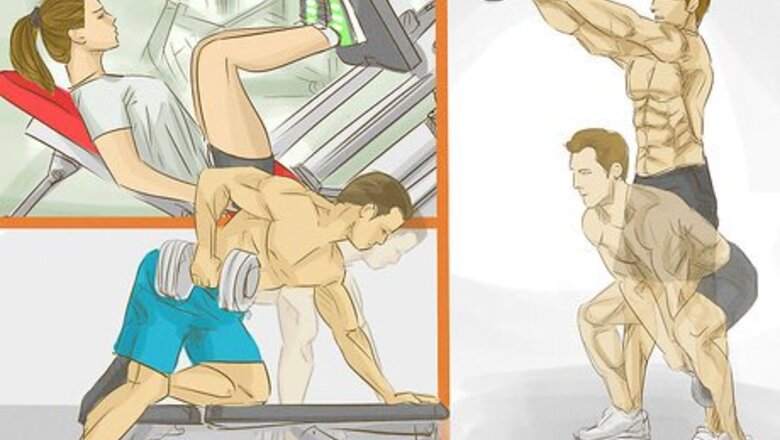
views
Working Out to Gain Muscle
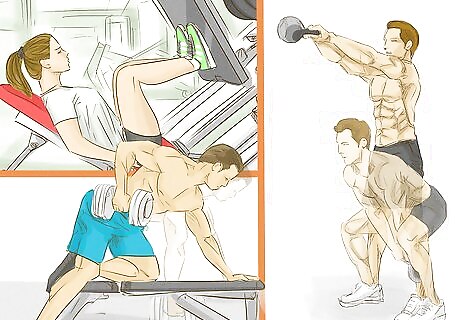
Start with basic strength training. Most workouts for your major body parts should start with basic, multi-joint strength training exercises that allow you to lift more weight overall, such as the bench presses for chest, overhead presses for deltoids, barbell rows for back and squats for legs. This will allow you to lift heavier on these exercises, while you're still fresh and have enough energy to better stimulate muscle growth.
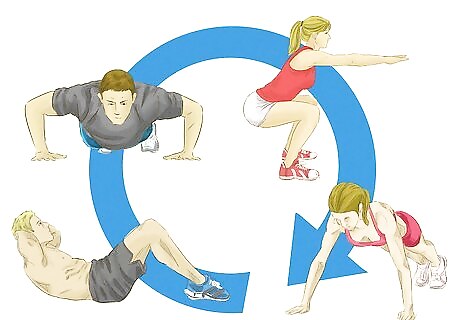
Go all in. Doing high-intensity workouts is the key to building muscle. Light workouts, even if they're long, don't go nearly as far to produce the right conditions for your muscles to break down and rebuild. Plan on doing 30-45 minute sessions 3-4 times per week (every other day). This may sound like a surprisingly manageable plan, but remember that during each session you have to make it as intense as possible. Your muscles will definitely get sore at first, but that will ease up once you get going with a routine. During each session, lift as much weight as you can using the correct form. Test your limits to find out how much weight you should lift by doing reps with different weights. You should be able to do 3-4 sets of 8-12 reps without having to put the weights down. If you can't, lower your weight. Generally, the 6-12 rep range stimulates bulky muscle growth, while lower reps favor strength gain at the expense of muscle size. If you can do 10 or more reps without feeling a burn, add more weight. You simply will not get bigger unless you challenge yourself to go all in.
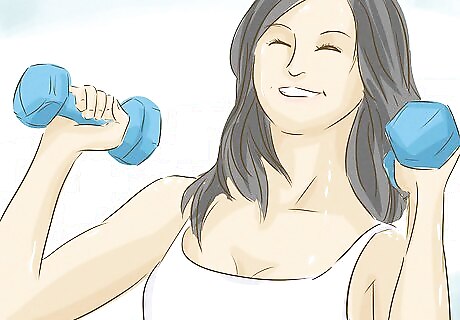
Lift explosively. Lift the weight quickly but lower slowly.
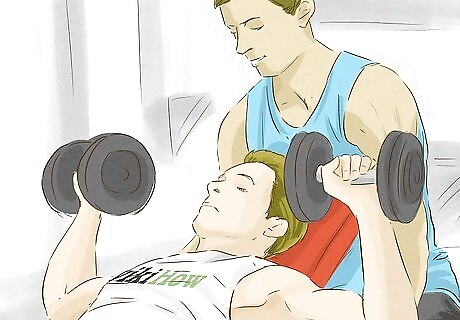
Use proper form. To develop precise technique, do every rep with good form. Beginners, strive to keep the rep target inside your strength capabilities. Find the right groove for each exercise. Don't train to fail when you're just starting. You should be able to complete the full motion of an exercise without having to lean over or change position. If you can't, you should be lifting less weight. In most cases you'll start with your arms or legs extended. Work with a trainer for a few sessions so you'll learn the right form for different exercises before continuing on your own.
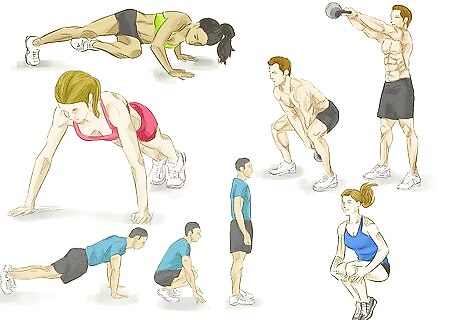
Alternate muscle groups. You don't want to work out the same groups with every workout, or you'll end up damaging your muscles. Rotate muscle groups so that each time you work out, you're putting in an intense hour working on a different group. If you work out three times a week, try something like this: First workout: do exercises for your chest, shoulders, back, and abs. Second workout: focus on your legs, triceps, and biceps Third workout: Do your abs and chest again.
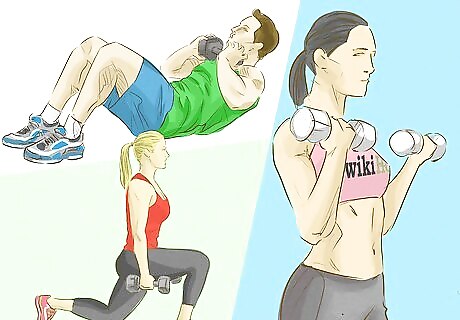
Avoid plateaus. If you do the same thing over and over each time you work out, you're not going to make progress. You need to be adding weight, and when you plateau with the new weight, switch up your exercises. Stay aware of the progress you're making and take notice when it seems like your muscles haven't changed in a while; it could be a sign that you need to switch things up in the weight room.

Rest between workouts. For someone with a fast metabolism, the rest period is almost as important as the workouts. Your body needs time to build muscle without burning a lot of calories doing other activities. Running and other cardio exercises can actually impede the growth of muscles. Take it easy in between workouts instead. Get a good night's sleep so you're fresh for the next workout.

Develop a mind-muscle connection. Research confirms that tuning in to the mind-muscle connection can optimize your results in the gym. Instead of focusing on your day, or the blonde next to you, strive to get into a muscle-building mindset to help increase gains. Here's how to do it: Visualize your target muscle growing as you complete every rep. If you're doing lifts with one hand, place your other hand on the muscle you're hoping to improve. Doing this can help you feel exactly where the muscle is straining, and help you refocus your efforts. Remember, it's not the amount of weight on the bar that's important; it's the effect of that weight on the muscle that leads to increases in the size and power you're after. This has a lot to do with how you're thinking and what you’re focused on. EXPERT TIP Laila Ajani Laila Ajani Fitness Trainer Laila Ajani is a Fitness Trainer and founder of Push Personal Fitness, a personal training organization based in the San Francisco Bay Area. With over 10 years as a trainer and exercise specialist, Laila has expertise in competitive athletics (gymnastics, powerlifting, and tennis), personal training, distance running, and Olympic lifting. Laila is certified by the National Strength & Conditioning Association (NSCA), USA Powerlifting (USAPL), and she is a Corrective Exercise Specialist (CES). Laila Ajani Laila Ajani Fitness Trainer Not only does strength training build your body's muscles, it requires your brain to focus and work hard. What I find fascinating about strength training is that it combines mindfulness with physical activity. To improve your lifts and become better at strength training, you have to focus your attention during your workout.
Eating to Gain Muscle
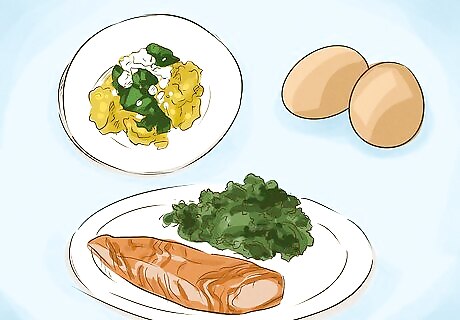
Eat high-calorie whole foods. You should be getting your calories from nutritious whole foods that will give your body the right kind of fuel to build up your muscles fast. Foods high in sugar, bleached white flour, trans fats, and additives are high in calories but low in nutrition, and they're going to build fat instead of muscle. If you want your muscles to grow and look defined, you need to eat an array of whole foods from every food group. Eat calorie-rich protein dishes like steak and roast beef, roasted chicken (with skin and dark meat), salmon, eggs, and pork. Protein is very important when you're building muscle. Avoid bacon, sausage, and other cured meats, which contain additives that aren't good for you to eat in large quantities. Eat plenty of fruits and vegetables of all kinds. They provide you with fiber and essential nutrients and help to keep you hydrated. Eat whole grains like oatmeal, whole wheat, buckwheat, and quinoa instead of white bread, biscuits, muffins, pancakes, waffles, and similar foods. Eat legumes and nuts like black beans, pinto beans, lima beans, walnuts, pecans, peanuts, and almonds.

Eat more than you think you need. Do you eat when you're hungry, and stop when you're full? That sounds normal enough, but when you aim to gain muscle fast, you need to be eating a lot more than you usually would. If your goal is to gain weight, add an extra serving to every single meal, and more if you can handle it. Your body needs the fuel to build muscle: it's as simple as that. A good muscle-building breakfast might include a bowl of oatmeal, two to four eggs, and one to two pieces of fruit, such as an apple, an orange, or a banana. For lunch, you might eat a chicken sandwich on whole wheat bread, several handfuls of nuts, an avocado, and a big kale and tomato salad with grapeseed oil dressing. For dinner, have a big piece of steak or another protein, potatoes, and vegetables. Have an extra serving of each if you need more fuel for your gains.

Eat at least five meals a day. Don't wait until your stomach is growling to eat again; you need to be constantly refueling your body when you're in a muscle-building phase. This isn't going to last forever, so try to enjoy it! Eat two additional meals in addition to breakfast, lunch, and dinner.
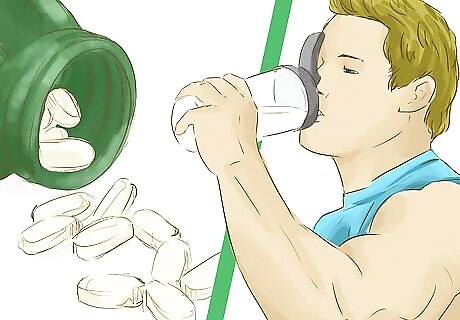
Take supplements but don't rely on them. You can't rely on muscle-building protein shakes to do the job for you. To build muscles, you need to be getting the vast majority of your calories from calorie-rich whole foods. That said, you can help accelerate the process by taking certain supplements that have been shown not to harm the body. Creatine is a supplement that has been shown to increase your ATP stores, which is the chemical compound that your body uses to fire your muscles. This means you can do more reps before your ATP stores are depleted, which means more total volume. It comes in a powdered form, and you mix it with water and drink 3 grams of it once a day. Protein shakes like Ensure are acceptable supplements to have around for when you're having trouble eating enough calories between meals.

Stay hydrated. Working out as hard as you have to in order to gain muscle can dry you out quickly. Combat this by carrying a water bottle with you wherever you go, and drinking whenever you feel thirsty. Ideally, you should be consuming around 3 liters (0.8 US gal) per day. Drink extra water before and after workouts. Give up sugary or carbonated drinks. They won't help your overall fitness, and they might actually hold you back when it comes to strength training. Alcohol isn't helpful, either. It dehydrates you and leaves you feeling low energy.

Get to know your body better. What's working, and what isn't? As you change your body, pay attention to what's happening with your muscles. Everyone's different, and food that might not do much for one person might be helpful for someone else. If you don't see improvements one week, switch it up and try something else next week.
Focusing On Muscle Building

Get more than enough sleep. Sleep is very important for giving your muscles a chance to grow. Getting at least seven hours of sleep a night is the minimum, 8-9 is ideal.
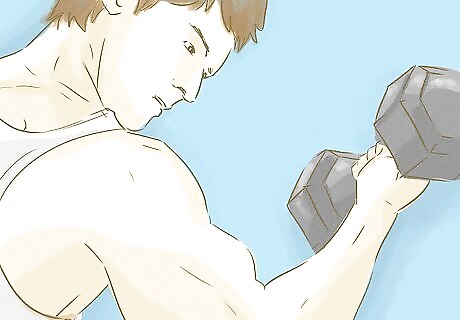
Focus exclusively on weight training. You might enjoy other cardio activities (sports, running, etc.) but those put additional strain on your body (muscles, joints) and use up energy that could be used instead to build muscle. Normally, cardio activities should definitely be included for all-around health, but if you're temporarily focused on building muscle quickly, focusing on weight training exclusively for a few months will help you reach that goal. EXPERT TIP Laila Ajani Laila Ajani Fitness Trainer Laila Ajani is a Fitness Trainer and founder of Push Personal Fitness, a personal training organization based in the San Francisco Bay Area. With over 10 years as a trainer and exercise specialist, Laila has expertise in competitive athletics (gymnastics, powerlifting, and tennis), personal training, distance running, and Olympic lifting. Laila is certified by the National Strength & Conditioning Association (NSCA), USA Powerlifting (USAPL), and she is a Corrective Exercise Specialist (CES). Laila Ajani Laila Ajani Fitness Trainer Women shouldn't worry that weight training will drastically change their bodies. Female clients sometimes worry that weight training will make their bodies "bulky", or less feminine. However, due to biological factors, it's hard for females to put on the same amount of muscle mass as males. It's unlikely you'll achieve a bulky look unless you're overdoing it at the gym.















Comments
0 comment